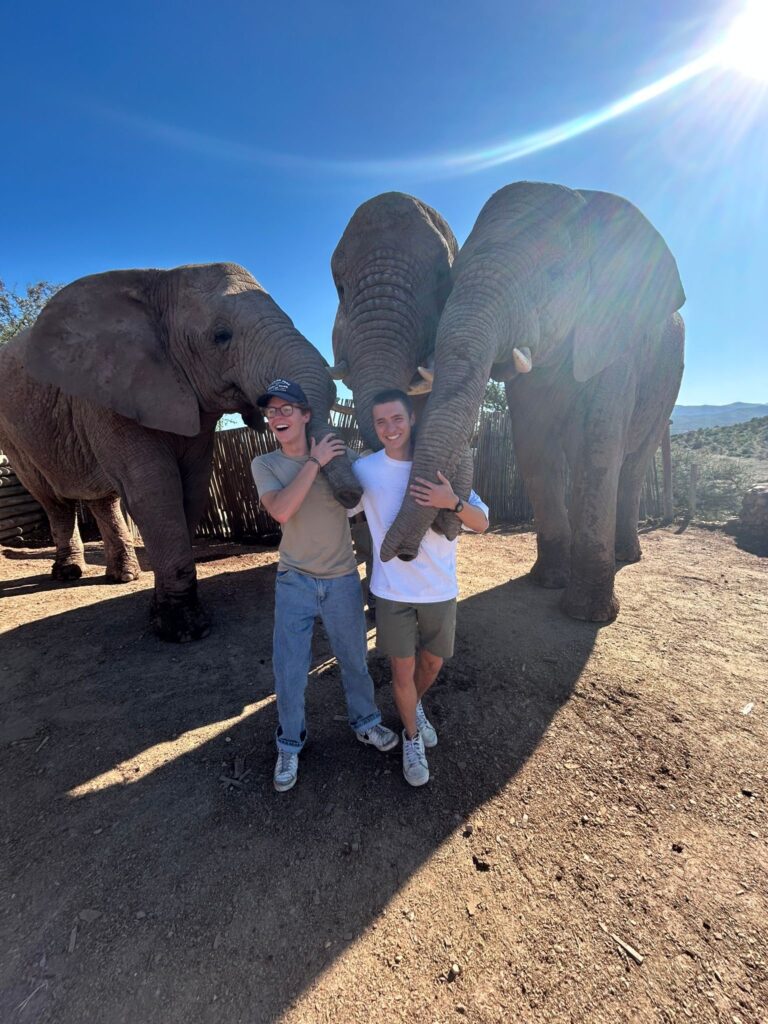
Driving to my first day of work as an intern focusing on entrepreneurship at the SOZO Foundation, a nonprofit founded in Cape Town in 2011, I witnessed a reality that felt hard to comprehend. Vrygrond, one of the oldest townships in Cape Town and home to almost forty thousand people, is unlike anything I had experienced before. The houses were resourcefully built with available materials, but to the unknowing eye, they looked thrown together. There are trash-strewn, unpaved streets and bustling traffic both on foot and in vehicles of all types.
It is an area lacking in resources and traditional opportunities, but it is alive. Despite the poverty, there is incredible beauty—colorful art adorns the walls and children play in the streets, enjoying life in the way only kids can. Individuals live their lives, care for their families, and make a living as humanitarian projects peppered throughout the neighborhoods bring hope. There are businesses everywhere, too. Barber shops, convenience stores, and fruit sellers adorn each street like ornaments on a Christmas tree, adding bright colors and a sense of agency to a place that my foreign eyes couldn’t understand.
Everywhere I went, I saw people making the most of what they had available, caring for each other, lifting themselves and their community up. Something I rarely experienced back home in New York City.
Innovation, resourcefulness, and ingenuity seem to grow out of the soil itself like the roots of a tree, not supported by external investment, infrastructure, or ideas. A web, a social and economic system that is alive and growing.
I was surprised to see the ingenuity and passion that people put into every piece of their lives, especially into each other. I saw an entirely new brand of entrepreneur. These people redefined the fundamentals of entrepreneurship—believing you can shape your world. This led me to realize that I had a narrow definition of what an entrepreneur was. Admittedly, I wasn’t prepared for how much Vrygrond would expand my understanding of the world.
A Changing View on Entrepreneurship
To me, a kid with options coming from a boundless city that breeds ambition and action, defining an entrepreneur was simple. They were the best of the best. They were the ones who had to stoop under the ceiling of what was achievable and raise it to new heights, standing proudly over all else.
Based on my experience growing up in New York City, entrepreneurship was always the peak—the absolute apex—of choice. It represented the best-of-the-best stepping away from cushy jobs, from golden opportunities earned but no longer valued, to bravely chart their own path. Entrepreneurs were the chosen few who left safety behind to chase dreams of innovation and glory because they had earned the right to.
They were connected visionaries who saw things differently, more ambitiously. Entrepreneurship meant elite risk-taking, flashy startups, venture capital pitches, Silicon Valley—and, of course, the prestige that came with it.
Entrepreneurship was a label that I would never have thought to use at first glance of Vrygrond. A label contorted by the western ideals I grew up in. A label that often shut doors and burned bridges, the opposite of what I learned being an entrepreneur fundamentally is.
Vrygrond challenged this perspective. Entrepreneurship at its core is a bottom-up profession that comes in all types of forms.
The ‘Hustler’ Entrepreneur
There was one woman who inspired this change in me, her name is Carlyn Sassman, a speaker from the NYDA, a government organization focusing on youth development. She came to speak to our cohort that included 9 women and 2 men ages 19-34—people with ambition to be stylists, chefs, daycare owners, and a DJ. She focused on the entrepreneur mindset and introduced the term ‘hustlers’ into my vocabulary. She embraced the complexity and nuance of being a ‘hustler.’
A hustler isn’t about big ideas or chasing glory. A hustler is driven by necessity. Hustlers don’t start businesses for prestige; they start them because it’s their only option. They work to solve today’s problems today—putting food on tonight’s table, paying rent, and providing for loved ones.
The hustler’s mantra isn’t innovation; it’s adaptation. It’s using borrowed clippers to cut hair in a shack you built on the side of the street. It’s setting up a food stall out of your home because you love to cook. It’s creating something from practically nothing because there is no alternative.
Hustlers are resourceful, resilient, and relentlessly practical.
But they operate in survival mode: always urgent, always immediate, always now.
My students were hustlers. They came to SOZO’s Genesis Hub to learn about starting businesses because they didn’t have other options. This clashed with my ideas of how to start a business and who entrepreneurs were.
I was grappling with how Jeff Bezos, Wendy Kopp, the founder of Teach for America, and these young hustlers from a South African Township could all simultaneously be entrepreneurs? Is there enough room in that definition?

Expanding the Definition of Entrepreneurship
Entrepreneurship, as I originally understood it, was innately built for those who have options, for those who can raise money, and for those with enough time on their hands to shape their vision with the precision of a Roman stonemason. This was the antithesis of what my students knew from their lived experience, and I came to understand that this privileged definition held them back from achieving everything I knew they were capable of.
My students, who grew up in the surrounding area, existed in a harsh economic and social reality. There was a lack of resources, opportunities, education, and an omnipresent exposure to violence that hung like a dark cloud over their lives. They needed to focus on today and tomorrow, and the pressing needs of daily life. This crowded out long-term planning and limited their sense of personal agency. I initially wondered how entrepreneurship could flourish under these conditions—until I learned to recognize it in new forms.Their short-term thinking, small customer networks, simple marketing strategies, highly malleable perspectives, and a deeply rooted community-based mindset were logical and beneficial adaptations to the reality they were born into.
A network of entrepreneurs meeting the needs and growing the resources of the entire community was there in plain sight. The rich symbiosis of agency, innovation, and care that I hadn’t been exposed to before was impressive
Realizing this, my perspectives began to change and become more nuanced. I opened my eyes to the value these adaptations added. I focused more on how they could succeed using these incredible strengths they learned in Vrygrond. This change led me to redefine how I thought of entrepreneurs. It is not how much you have but what you do with your resources that benefits your community. I grew to empathize with and respect their actions, rather than being confused by them. Their adaptability enabled them to solve problems on the spot. Their community-centered focus was evident in a generosity that attracted and retained customers, rather than resulting in a loss of profit.
I started to teach them differently, too. Instead of making slideshows and standing in front of a monitor, I sat down with them in a boardroom and began listening. Their feedback for each other was just as good, if not better, than my own. I wanted them to empower each other to be the best entrepreneurs and business owners in their communities and in Cape Town—however they defined success within their community and not by my New York City, Wall Street definition.
As a result, my role in their lives evolved. Instead of preaching my ideals and high standards, I started to focus on adding a new perspective to their solutions. They often had the answers and only needed a slight nudge of confidence or encouragement to act on it and to trust themselves. I pressed reframing ideas more than offering advice, and spent more time discussing real-life circumstances than textbook lessons and formulas using Blue-Chip companies as examples. It made me realize that the local community just needed empowerment, not a savior.
The New Entrepreneur
Overall, this experience helped me grow significantly. I saw myself being slower to judge, more humble, and more empathetic, asking ‘why’ more often than trying to decide for myself. I truly understand what it takes to achieve personal success when it matters most. I have a much richer sense of what being an entrepreneur truly is.
From my shift in teaching style, accompanied by a newfound sense of empathy, I created a new definition of entrepreneurs. The new entrepreneur isn’t limited to the exceptional few with countless options, nor are they defined solely by short-term necessity like the hustler.
Instead, the new entrepreneur is inclusive, adaptable, and deeply resilient. A new entrepreneur is someone who believes in themselves; they might not start from a position of privilege, but they certainly start with agency—a powerful belief that they can shape their world. They prioritize long-term sustainability, adaptability, and opportunity creation, not just immediate gain.
New entrepreneurs aren’t measured by pedigree, connections, or elite ambitions. They’re defined by their willingness to act, their belief that even their smallest actions can have a meaningful impact on those around them. They possess genuine curiosity, relentless dedication, and resilience. The new entrepreneur builds their own doors and bridges.

Entrepreneurship to Meet the Moment
As the world is reshaped by advances in Artificial Intelligence (AI) and automation, we will need more necessity-driven entrepreneurship like I found in Vrygond to meet the moment. While the promise of AI is to uplift all of humanity, the harsh reality of job loss could put that further out of reach for everyone, including those who have traditionally had an abundance of opportunities.
Many jobs that are low-hanging fruit for capable, intelligent people may not be available in the next decade, so we will have to plant our own orchards. We will have to open doors for ourselves, just like my students in SOZO.
Expanding the definition of entrepreneurship is essential for a brighter future, a future anyone can be a part of. Being a ‘new entrepreneur’ by working hard, innovating, and adapting can counteract the lack of job opportunities and can allow anyone to reach new heights.
The Entrepreneur in All of Us
The lessons I learned in Vrygrond are ubiquitous and universally relevant. They’re not abstract or a world away. So, to all, despite your resources and the systematic inequalities that exist,focus on what you can innovate, work hard to open doors for yourself, and believe that you are an entrepreneur just as much as anyone else. Uplift those around you and strive for a better future, one without closed doors.
To be a part of this growing, changing world, take a few hints from my experiences at SOZO. Be humble, listen, relate to others, stand back up when you fall, grow alongside the world, and uplift your community. This applies to your studies, relationships, and especially what you look for in leaders. Entrepreneurship is fundamentally about agency and believing in yourself—you can only go as far as you push yourself.
This is the most important thing I learned from my time with SOZO because entrepreneurship empowers people. It gives each and every person the ability to achieve their dreams. It also shows that the only person who can make that happen is you. As you continue to live and grow alongside the world, define entrepreneurship for yourself. Challenge your own beliefs clearly and directly to discover what entrepreneurship means to you, just as I have.
Entrepreneurship at its core is an act of believing: believing you can shape your world. Isn’t it time we encouraged everyone—no matter their starting point—to take that small, decisive first step?
– Thomas Growney
Co-founder, Service Academy
